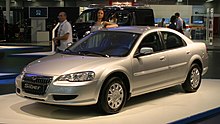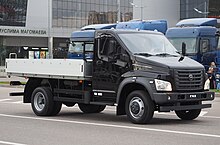| The article's lead section may need to be rewritten. Please help improve the lead and read the lead layout guide. (September 2013) (Learn how and when to remove this message) |
 | |
 GAZ plant site main entrance, 2019 GAZ plant site main entrance, 2019 | |
| Native name | Го́рьковский автомоби́льный заво́д |
|---|---|
| Company type | Subsidiary |
| Industry | Automotive Defense industry |
| Founded | 1932; 92 years ago (1932) Nizhny Novgorod (named Gorky 1932–1990) |
| Headquarters | Nizhny Novgorod, NIZ, Russia |
| Key people | Vadim Sorokin (president & CEO of GAZ Group), Siegfried Wolf (chairman of the board, OJSC GAZ, Russian Machines), Manfred Eibeck (chief executive officer, Russian Machines) |
| Products | Automobiles, automotive parts |
| Revenue | $1.46 billion (2017) |
| Operating income | $116 million (2017) |
| Net income | $1.58 million (2017) |
| Total assets | $1.02 billion (2017) |
| Total equity | $43.2 million (2017) |
| Owner | Oleg Deripaska |
| Parent | GAZ Group |
| Subsidiaries | LDV (2006-2008) |
| Website | Gaz website |

GAZ or Gorkovsky avtomobilny zavod (Russian: ГАЗ or Го́рьковский автомоби́льный заво́д, lit. 'Gorky Automobile Plant') is a Russian automotive manufacturer located in Nizhny Novgorod, formerly known as Gorky (Горький) (1932–1990). It is the core subsidiary of GAZ Group Holding, which is itself part of Basic Element industrial group. JSC Russian Machines is the controlling shareholder in OAO GAZ.
History
Early history
See also: Bombing of Gorky in World War IIIn May 1929 the Soviet Union signed an agreement with the American Ford Motor Company. Under its terms, the Soviets agreed to purchase $13 million worth of automobiles and parts, while Ford agreed to give technical assistance until 1938 to construct an integrated automobile-manufacturing plant at Nizhny Novgorod. The factory was founded and production started on 1 January 1932. At the time the factory was known as Nizhny Novgorod Automobile Plant, short NAZ (Nizhegorodskiy avtomobilny zavod), full name Nizhny Novgorod Automobile Plant named after V. M. Molotov (Nizhegorodskiy avtomobilny zavod imeni V. M. Molotova), after the Soviet minister Vyacheslav Molotov. In 1932 the plant produced its first automobiles, GAZ-AA (originally known as NAZ-AA, as they were manufactured before Nizhny Novgorod became Gorky) truck and GAZ-A passenger car (manufactured after Nizhny Novgorod became Gorky). The cars were based on the Ford Model AA and Ford Model A, respectively.
In 1933, the factory's name changed to Gorkovsky avtomobilny zavod, or GAZ, when the city was renamed after Maxim Gorky.
The GAZ-A was succeeded by the more modern GAZ-M1 (based largely on the four-cylinder version of the Ford Model B), produced from 1936 to 1942. The M letter stands for Molotovets ('of Molotov's fame'), it was the origin of the car's nickname, M'ka (эмка).
During the war, GAZ assembled Chevrolet G7107 and G7117 (G7107 with winch) from parts shipped from the US under Lend Lease.
Postwar period

At that time, GAZ engineers worked to develop an all-new car model to enter production once hostilities ended. Called the GAZ-M20 Pobeda (Victory), this affordably-priced sedan with streamlined, fastback styling, entered production in 1946 and was produced by GAZ until 1958. (Licensed production under the name Warszawa continued in Polish FSO until the 1970s). It was the first Soviet car with electric windshield wipers (rather than mechanical- or vacuum-operated ones).
GAZ also made GAZ-12 ZIM, GAZ-21 and GAZ-24 Volga and the luxury cars GAZ-13 and GAZ-14 Chaika. The ZIM was the first GAZ car to feature the leaping deer hood ornament. The GAZ-21 made its public debut in 1955, with a three cars on a demonstration drive from Moscow to the Crimea, two automatic models and a manual. It was launched in 1956 and became a symbol of the whole Soviet epoch. The car offered front seats able to fold flat and came standard with cigarette lighter and a radio at a time when most American-built cars did not have a radio. A small number of Volgas with the 195 hp (145 kW; 198 PS) Chaika engine, automatic transmission, and power steering were built for the KGB as the M23, 603 were built in 1962–1970. As the car's leading engineer Boris Dekhtyar recalled, the new version of the Volga had improved brake pads and reached a higher top speed of over 170 km/h; it was well received. The new engine produced 195 h.p. at 4,400 rpm.
In the 1960s GAZ plant renewed its truck range by launching such models as GAZ-52, GAZ-53А and GAZ-66. In the 1960s and 1970s, the plant was overhauled and updated; 1962 saw it fitted with the Soviet Union's first automated precision shop. In 1994 the plant started production of GAZelle light commercial vehicles.
The plant became AvtoGAZ, with the integration of its various subcontractors, on 24 August 1971; the same year, it was awarded the Order of Lenin. GAZ produced its ten millionth vehicle in March 1981. In the late 1990s GAZ was deemed to be the best managed Russian automotive manufacturer.
SibAl takeover

In November 2000 GAZ was acquired in a hostile takeover by SibAl. In March 2003 GAZ declared that the production of passenger cars was no longer a priority for the company, and plans to release a new GAZ-3115 model had been abandoned.
In 2006, GAZ made a move on the LDV company based in Birmingham, England, and acquired the van maker from the venture capital group Sun European Partners, LLP in July of that year. GAZ said that they planned to market the MAXUS (LDV's new Panel-van that was released in January 2005) into the rest of Europe and Asia. GAZ proposed to increase production in the LDV plant in England, while also commencing production of the MAXUS in a new plant in Russia. However, due to the recession, the production at the LDV plant was halted and the plant was sold to a Chinese company called ECO Concept in 2009.
As then DaimlerChrysler modernized its Sterling Heights Assembly plant in 2006, the old Chrysler Sebring / Dodge Stratus assembly line and tooling was sold to GAZ and was shipped to Nizhny Novgorod in Russia. Since then GAZ car facility is used for contract manufacturing for Volkswagen and General Motors.
Andersson leadership

In 2009, Bo Andersson, former Vice-President of General Motors, was invited to become a President/CEO of GAZ Group.
In 2010, GAZ upgraded its model range by launching new GAZelle-BUSINESS lineup with diesel and petrol engines and LPG equipment.
In November 2010 the company decided to end production of the Volga Siber, its last GAZ passenger car model, and to discontinue the GAZ Volga range. In December 2010, GAZ Group signed a memorandum of understanding with Daimler on contract manufacturing of Mercedes-Benz Sprinter at GAZ plant in Nizhny Novgorod. It is expected that production will start in 2013.
In February 2011, General Motors and GAZ Group signed an agreement on contract assembly of the new Chevrolet Aveo car at GAZ plant in Nizhny Novgorod. As of December 2012, production was underway with an expected annual production of 30,000 vehicles.
In June 2011, Volkswagen Group Rus and GAZ Group signed a long-term agreement on contract manufacturing at GAZ plant with total investment of €200 million. It is planned to produce Škoda Yeti, the new Volkswagen Jetta and Škoda Octavia. The total production volume in the peak years will be about 110,000 vehicles. In November 2011, under the contract manufacturing agreement, GAZ started SKD assembly of Škoda Yeti; full-cycle production started in December 2012.
Recent developments
| This section needs to be updated. Please help update this article to reflect recent events or newly available information. (May 2024) |
In April 2019, GAZ asked for a $468 million bailout from the Russian government, saying that US sanctions on Oleg Deripaska and his assets put the company at risk of default. On July 4, 2019, workers from GAZ protested against the US sanctions in front of the US embassy in Moscow as an opposition to measures they claim will lead to the bankruptcy of the company.
In November 2021, "GAZ Group" announced that its division, "Silovye Agregaty", would be ready for mass production of hydrogen engines in 2.5 years.
See also
- List of GAZ vehicles
- Automobile model numbering system in the Soviet Union and Russia
- History of Ford Motor Company
References
- "Top Management". Gazglobal.com. Archived from the original on 21 June 2017. Retrieved 8 July 2017.
- ^ "Бухгалтерская отчётность". Retrieved 1 November 2018.
- ^ Odin, L.C. World in Motion 1939 - The whole of the year's automobile production. Belvedere Publishing, 2015. ASIN: B00ZLN91ZG.
- Zur Geschichte der Zusammenarbeit zwischen Ford und Russland bzw. der Sowjetunion der Jahre 1909 bis 1935 (russian)
- Thompson, p. 52
- Thompson, p. 68
- ^ Thompson, p. 61
- Thompson, p. 62
- Flory, J. "Kelly", Jr. American Cars 1946-1959 (Jefferson, NC: McFarland & Coy, 2008), passim.
- Thompson, pp. 120–121
- Б. А. Дехтяр. "Хвостовые" автомобили ГАЗ. // Биржа плюс Авто. №36. 13.09.2001. С. 38 Archived 23 December 2016 at the Wayback Machine
- Легковой автомобиль ГАЗ-23. Инструкция по уходу. Издание второе. Горький. 1967. С. 114 Archived 3 January 2014 at the Wayback Machine
- Thompson, p. 120
- Thompson, Andy. Cars of the Soviet Union (Haynes Publishing, Somerset, UK, 2008), p. 120.
- Thompson, p. 242
- "Mir on earth". The Economist. 21 August 1997. Archived from the original on 21 June 2017. Retrieved 7 July 2017.
- Ireland, R. Duane; Hoskisson, Robert; Hitt, Michael (2005). Understanding Business Strategy: Concepts and Cases. Cengage Learning. pp. 143–145. ISBN 032428246X. Retrieved 6 July 2017.
- Емельянова, Екатерина; Идиатуллин, Шамиль; Трифонов, Владислав (13 May 2003). "Время менять автомобиль". Газета "Коммерсантъ". p. 20. Archived from the original on 30 July 2013. Retrieved 8 July 2017.
- Ruddick, Graham (15 October 2009). "LDV Vans bought by China's Qu Li". London: The Telegraph, 15 October 2009. Archived from the original on 27 February 2010.
- "US: GAZ to buy Sebring/Stratus assembly line from Chrysler". Just-Auto, 18 April 2006. Archived from the original on 27 September 2011.
- "For former GM exec Bo Andersson, next job will be a GAZ". 16 June 2009.
- "GAZ Group has started serial production of upgraded GAZelle-Business" (Press release). GAZ Group. 25 February 2010. Archived from the original on 25 September 2011.
- "Q&A: Bo Andersson Joined GAZ to Flee Detroit Stardom". Retrieved 8 July 2017.
- "Russia: Daimler, GAZ sign Sprinter assembly MoU". Automotive World, 24 December 2010. 24 December 2010. Archived from the original on 16 March 2012.
- "GM to assemble Chevrolets at Russia's GAZ plant". Reuters, 1 February 2011. 1 February 2011. Archived from the original on 24 September 2015.
- Andrew E. Kramer (25 December 2012). "Russia's Desire for Cars Grows, and Foreign Makers Take Notice". The New York Times. Archived from the original on 26 December 2012. Retrieved 26 December 2012.
- "Skoda Yeti Now Assembled at GAZ Full Cycle". wroom.ru. 6 December 2012. Archived from the original on 5 January 2013. Retrieved 31 December 2012.
- Times, The Moscow (18 April 2019). "Sanctions-hit GAZ Wants Government Bail-Out – Kommersant". The Moscow Times. Retrieved 5 June 2019.
- Foy, Henry (4 July 2019). "Workers at Deripaska's sanctioned GAZ picket US embassy party in Moscow". Financial Times. Archived from the original on 10 December 2022. Retrieved 27 July 2019.
- "Russian Workers Rap Against Sanctions, Protest at U.S. Envoy's Residence". The Moscow Times. 5 July 2019. Retrieved 27 July 2019.
- "Группа ГАЗ может запустить массовое производство водородных двигателей через 2,5 года" (in Russian). ТАСС. 24 November 2021.
External links
- Official site of the plant
- GAZ official website (in English)
- GAZ official website (in Russian)
- GAZ automotive history (in Russian and English)
| Manufacturers and brands |
| ||
|---|---|---|---|
| Foreign subsidiaries | |||
| Foreign companies with former operations | |||
| Defunct companies | |||
| Related topics | |||
| GAZ, a subsidiary of GAZ Group, car timeline, 1930–1959 — next » | ||||||||||||||||||||||||||||||||||||||||||||||||||||||||||||||||||||||||||||||||||||||||||||||||||||||||||||||||||||||||||||||||||||||||||||||||||||||||||||||||||||||||||||||||||||||||||||||||||||||||||||||||||||||||||||||||||||||||||||||||||||||||||||||||||||||||||||||||||||||||||||||||||||||||||||||||||
|---|---|---|---|---|---|---|---|---|---|---|---|---|---|---|---|---|---|---|---|---|---|---|---|---|---|---|---|---|---|---|---|---|---|---|---|---|---|---|---|---|---|---|---|---|---|---|---|---|---|---|---|---|---|---|---|---|---|---|---|---|---|---|---|---|---|---|---|---|---|---|---|---|---|---|---|---|---|---|---|---|---|---|---|---|---|---|---|---|---|---|---|---|---|---|---|---|---|---|---|---|---|---|---|---|---|---|---|---|---|---|---|---|---|---|---|---|---|---|---|---|---|---|---|---|---|---|---|---|---|---|---|---|---|---|---|---|---|---|---|---|---|---|---|---|---|---|---|---|---|---|---|---|---|---|---|---|---|---|---|---|---|---|---|---|---|---|---|---|---|---|---|---|---|---|---|---|---|---|---|---|---|---|---|---|---|---|---|---|---|---|---|---|---|---|---|---|---|---|---|---|---|---|---|---|---|---|---|---|---|---|---|---|---|---|---|---|---|---|---|---|---|---|---|---|---|---|---|---|---|---|---|---|---|---|---|---|---|---|---|---|---|---|---|---|---|---|---|---|---|---|---|---|---|---|---|---|---|---|---|---|---|---|---|---|---|---|---|---|---|---|---|---|---|---|---|---|---|---|---|---|---|---|---|---|---|---|---|---|---|---|---|---|---|---|---|---|---|---|---|---|---|---|---|---|---|---|
| ||||||||||||||||||||||||||||||||||||||||||||||||||||||||||||||||||||||||||||||||||||||||||||||||||||||||||||||||||||||||||||||||||||||||||||||||||||||||||||||||||||||||||||||||||||||||||||||||||||||||||||||||||||||||||||||||||||||||||||||||||||||||||||||||||||||||||||||||||||||||||||||||||||||||||||||||||
| « previous — GAZ, a subsidiary of GAZ Group, car timeline, 1960–present | ||||||||||||||||||||||||||||||||||||||||||||||||||||||||||||||||||||||||||||||||||||||||||||||||||||||||||||||||||||||||||||||||||||||||||||||||||||||||||||||||||||||||||||||||||||||||||||||||||||||||||||||||||||||||||||||||||||||||||||||||||||||||||||||||||||||||||||||||||||||||||||||||||||||||||||||||||||||||||||||||||||||||||||||||||||||||||||||||||||||||||||||||||||||||||||||||||||||||||||||||||||||||||||||||||||||||||||||||||||||||||||||||||||||||||||||||||||||||||||||||||||||||||||||||||||||||||||||||||||||||||||||||||||||||||||||||||||||||||||||||||||||||||||||||||||||||||||||||||||||||||||||||||||||||||||||||||||||||||||||||||||||||||||||||||||||||||||||||||||||||||||||||||||||||||||||||||||||||||||||||||||||||||||||||||||||||||||||||||||||||||||||||||||||||||||||||||||||||||||||||||||||||||||||||||||||||||||||||||||||||||||||||||||||||||||||||||||||||||||||||||||||||||||||||||||||||||||||||||||||||||||||||||||||||||||||||||||||||||||||||||||||||||||||||
|---|---|---|---|---|---|---|---|---|---|---|---|---|---|---|---|---|---|---|---|---|---|---|---|---|---|---|---|---|---|---|---|---|---|---|---|---|---|---|---|---|---|---|---|---|---|---|---|---|---|---|---|---|---|---|---|---|---|---|---|---|---|---|---|---|---|---|---|---|---|---|---|---|---|---|---|---|---|---|---|---|---|---|---|---|---|---|---|---|---|---|---|---|---|---|---|---|---|---|---|---|---|---|---|---|---|---|---|---|---|---|---|---|---|---|---|---|---|---|---|---|---|---|---|---|---|---|---|---|---|---|---|---|---|---|---|---|---|---|---|---|---|---|---|---|---|---|---|---|---|---|---|---|---|---|---|---|---|---|---|---|---|---|---|---|---|---|---|---|---|---|---|---|---|---|---|---|---|---|---|---|---|---|---|---|---|---|---|---|---|---|---|---|---|---|---|---|---|---|---|---|---|---|---|---|---|---|---|---|---|---|---|---|---|---|---|---|---|---|---|---|---|---|---|---|---|---|---|---|---|---|---|---|---|---|---|---|---|---|---|---|---|---|---|---|---|---|---|---|---|---|---|---|---|---|---|---|---|---|---|---|---|---|---|---|---|---|---|---|---|---|---|---|---|---|---|---|---|---|---|---|---|---|---|---|---|---|---|---|---|---|---|---|---|---|---|---|---|---|---|---|---|---|---|---|---|---|---|---|---|---|---|---|---|---|---|---|---|---|---|---|---|---|---|---|---|---|---|---|---|---|---|---|---|---|---|---|---|---|---|---|---|---|---|---|---|---|---|---|---|---|---|---|---|---|---|---|---|---|---|---|---|---|---|---|---|---|---|---|---|---|---|---|---|---|---|---|---|---|---|---|---|---|---|---|---|---|---|---|---|---|---|---|---|---|---|---|---|---|---|---|---|---|---|---|---|---|---|---|---|---|---|---|---|---|---|---|---|---|---|---|---|---|---|---|---|---|---|---|---|---|---|---|---|---|---|---|---|---|---|---|---|---|---|---|---|---|---|---|---|---|---|---|---|---|---|---|---|---|---|---|---|---|---|---|---|---|---|---|---|---|---|---|---|---|---|---|---|---|---|---|---|---|---|---|---|---|---|---|---|---|---|---|---|---|---|---|---|---|---|---|---|---|---|---|---|---|---|---|---|---|---|---|---|---|---|---|---|---|---|---|---|---|---|---|---|---|---|---|---|---|---|---|---|---|---|---|---|---|---|---|---|---|---|---|---|---|---|---|---|---|---|---|---|---|---|---|---|---|---|---|---|---|---|---|---|---|---|---|---|---|---|---|---|---|---|---|---|---|---|---|---|---|---|---|---|---|---|---|---|---|---|---|---|---|---|---|---|---|---|---|---|---|---|---|---|---|---|---|---|---|---|---|---|---|---|---|---|---|---|---|---|---|---|---|---|---|---|---|---|---|---|---|---|---|---|---|---|---|---|---|---|---|---|---|---|---|---|---|---|---|---|---|---|---|---|---|---|---|---|---|---|---|---|---|---|---|---|---|---|---|---|---|---|---|---|---|---|---|---|---|---|---|---|---|---|---|---|---|---|---|---|---|---|---|---|---|---|---|---|---|---|---|---|---|---|---|---|---|---|---|---|---|---|---|---|---|---|---|---|---|---|---|---|---|---|---|---|---|---|---|---|---|---|---|---|---|---|---|---|---|---|---|---|---|---|---|---|---|---|---|---|---|---|---|---|---|---|---|---|---|---|---|---|---|---|---|---|---|---|---|---|---|---|---|---|---|---|---|---|---|---|---|---|---|---|---|---|---|---|---|---|---|---|---|---|---|---|---|---|---|---|---|---|---|---|---|---|---|---|---|---|---|---|---|---|---|---|---|---|---|---|---|---|---|---|---|---|---|---|---|---|---|---|---|---|---|---|---|---|---|---|---|---|---|---|---|---|---|---|---|---|---|---|---|---|---|---|---|---|---|---|---|---|---|---|---|---|---|---|---|---|---|---|---|---|---|---|---|---|---|---|---|---|---|---|---|---|---|---|---|---|---|---|---|---|---|---|---|---|---|---|---|---|---|---|---|---|---|---|---|---|---|---|---|---|---|---|---|---|---|---|---|---|---|---|---|---|---|---|---|---|---|---|---|---|---|---|---|---|---|---|---|---|---|---|---|---|---|---|---|---|---|---|---|---|---|---|---|---|---|---|---|---|---|---|---|---|---|---|---|---|---|---|---|---|---|
| ||||||||||||||||||||||||||||||||||||||||||||||||||||||||||||||||||||||||||||||||||||||||||||||||||||||||||||||||||||||||||||||||||||||||||||||||||||||||||||||||||||||||||||||||||||||||||||||||||||||||||||||||||||||||||||||||||||||||||||||||||||||||||||||||||||||||||||||||||||||||||||||||||||||||||||||||||||||||||||||||||||||||||||||||||||||||||||||||||||||||||||||||||||||||||||||||||||||||||||||||||||||||||||||||||||||||||||||||||||||||||||||||||||||||||||||||||||||||||||||||||||||||||||||||||||||||||||||||||||||||||||||||||||||||||||||||||||||||||||||||||||||||||||||||||||||||||||||||||||||||||||||||||||||||||||||||||||||||||||||||||||||||||||||||||||||||||||||||||||||||||||||||||||||||||||||||||||||||||||||||||||||||||||||||||||||||||||||||||||||||||||||||||||||||||||||||||||||||||||||||||||||||||||||||||||||||||||||||||||||||||||||||||||||||||||||||||||||||||||||||||||||||||||||||||||||||||||||||||||||||||||||||||||||||||||||||||||||||||||||||||||||||||||||||
56°14′47.20″N 43°53′23.58″E / 56.2464444°N 43.8898833°E / 56.2464444; 43.8898833
Categories:- GAZ
- Vehicle manufacturing companies established in 1932
- Russian brands
- Truck manufacturers of Russia
- Car manufacturers of Russia
- Truck manufacturers of the Soviet Union
- Defence companies of the Soviet Union
- Soviet Union–United States relations
- Car brands
- Luxury motor vehicle manufacturers
- Manufacturing companies based in Nizhniy Novgorod
- Russian entities subject to U.S. Department of the Treasury sanctions
